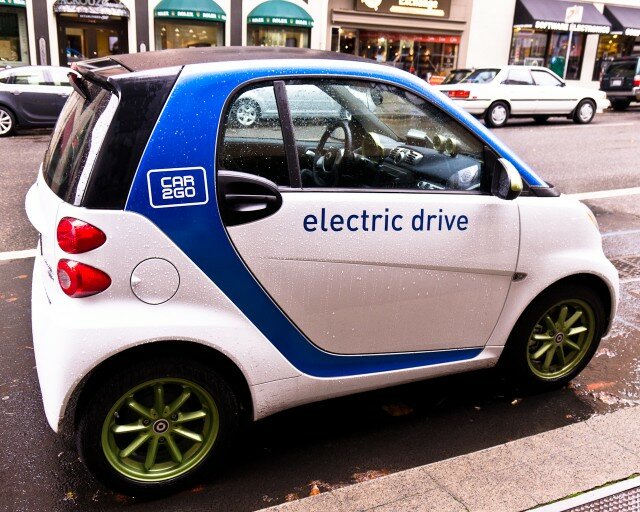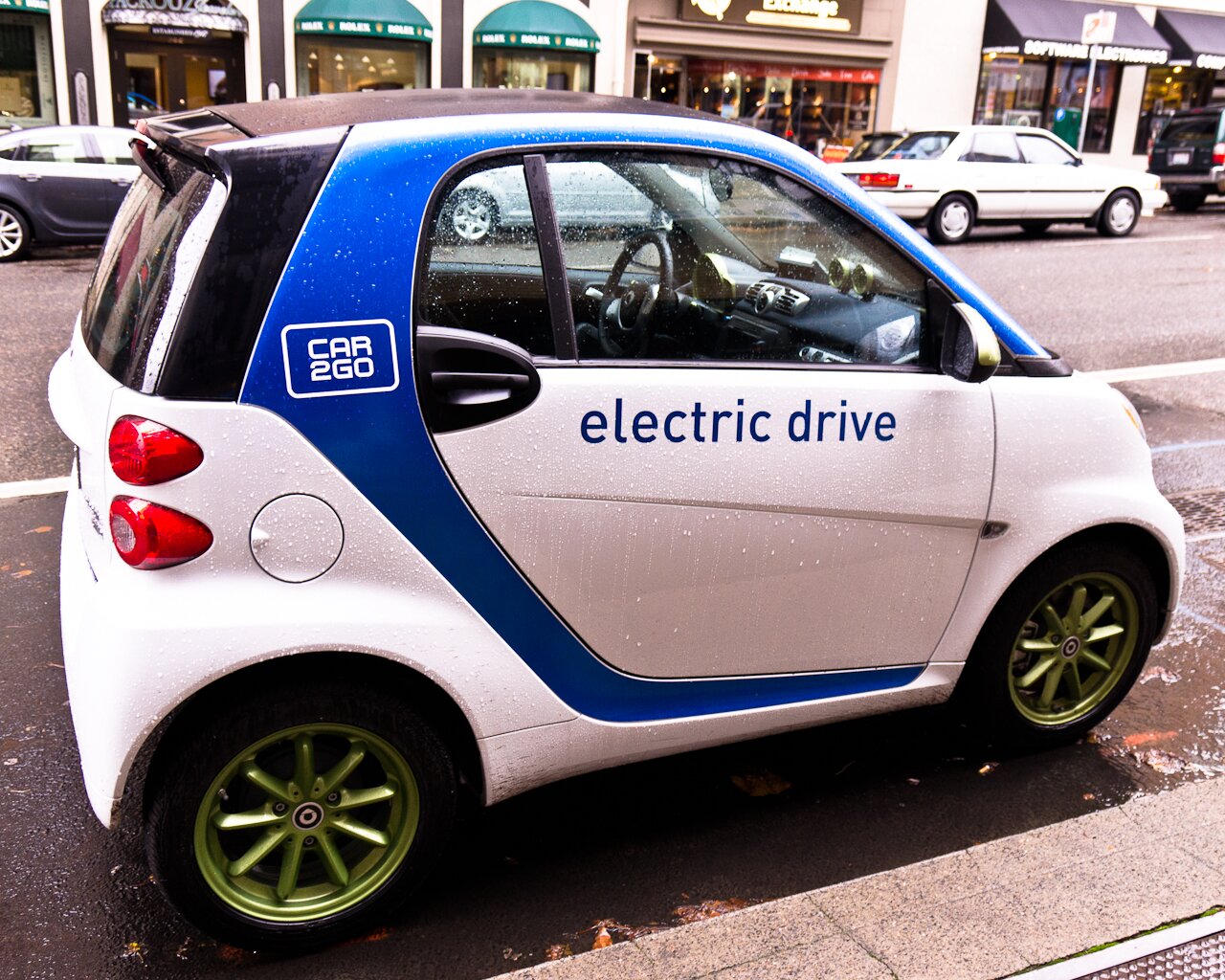
Today the Seattle City Council is weighing a pilot Car2Go program for Seattle, again. The point-to-point car-share service has already set up shop in Vancouver, B.C., and Portland, but Car2Go’s introduction to the Seattle City Council, back in October, raised a series of questions that led to revisions in the proposed service.
[UPDATE: The City Council’s Transportation Committee approved the Car2Go program. One interesting note: Car2Go drivers will be cleared to park in public parking even in the “Husky game day” restricted zone around Husky stadium.]
Car2Go planned to launch with 350 Fortwo Smart cars, and they have been cooped up in a parking lot since then. (Fortwo’s sold like hotcakes the first year, then sales plummeted: the two-seaters have room for two people and not much else, they’re too small for comfort for freeway driving, and the transmission is said to be lurchy. Quick, in-city, car-share trips are their sweet spot.)
Publicola reported on the initial Council pushback:
Opponents on the council, however, objected that the new service would allow cars to take up parking spaces that could otherwise be occupied by cars owned by homeowners who live nearby, or patrons of neighborhood businesses. They also questioned whether shared cars might threaten taxi drivers’ business. And they argued that the boundaries for car-sharing would exclude low-income Seattle residents, like those who live in Southeast Seattle, from the new system.
Most of these represent the kind of spurious, time-wasting “concerns” that this Council is infamous for–negative first impressions generated by people who haven’t looked into a project much, and still would like to put their oar in. The Council has already opened wide the door on “taking up parking spaces” around town, with the Zipcar car-share service, and the same rationale applies: in aggregate, car-share services increase the amount of useful parking available to people.
Threatening taxi business? It’s hard to know how to respond to that. Did you know that the City Council has a responsibility to protect the taxi industry from people driving themselves around? (Think of the dent in taxi fares that comes from allowing private cars in the downtown core at all.) As for boundaries, Car2Go only works if the cars — which can be dropped off at any legal public parking spot — are concentrated in a high-use area. (This is different than Zipcar, where cars stay strategically put.) Spread out 350 cars in a wide enough area, and you’ll have to take a bus to get to the closest one.
The Seattle Times explains that the public parking option is not a giveaway: the company has agreed to pay a base rate of $1,330 per car per year, with more to be paid depending upon where the cars are parked and for how long. GPS tracking will allow the city to see the ratio the cars spend parked in residential zones versus metered parking, for instance.
What’s of greater concern to anyone with 30 minutes to spend researching the company is the frequency of complaints from formerly thrilled customers. If the premise is not fully baked, then there’s little incentive to rush in just because Daimler has sales goals to meet.
Capitol Hill Seattle explains the cost structure: “Pricing includes a $35 annual fee and hourly rates. San Diego recently saw its Car2Go rates bump a $1 higher to $13.99 per hour with a $72.99 cap.” But Zipcar is $8 per hour, counter people who haven’t checked Zipcar rates recently ($10.25 to $11.25 is the norm, with certain vehicles costing more.)
With its hourly cap, Car2Go is already competitive with Zipcar, but by the minute, Car2Go’s rent for about $0.38. So on paper, at least, an 8-minute drive is just over $3. With Zipcar, of course, you have to bring the car back to its original spot, and that’s where Car2Go shines, because you can just park it and leave. (Car2Go also tries to keep the mostly-gas-powered fleet topped off for you, where Zipcar requires you to fill up at 1/4-tank or below.) The frugally minded can’t bear to take a Zipcar to a movie, for instance, because you end up paying for the time you’re not driving. Car2Go would seem to solve that.
Yet, according to Yelpers in Portland and elsewhere, Car2Go creates a host of new annoyances, largely because of its finicky electronics and a sense that the company is trying to extract every cent possible. Even if you disregard the people who didn’t seem to realize there was a one-time membership fee ($35) and that tiny cars are not great on the freeway, there are still far too many complaints about snafus with billing and the car’s glitchy electronics.
People find themselves unable to end their trip because there’s no signal. They complain about the two-part check-in and check-out system: you check in outside the car to unlock it, then check-in via a PIN and a touch screen once inside — the touch screen is said to be slow, and it runs you through a mandatory pre-rental checklist on the car’s condition, cleanliness, and so forth. The cumbersome process seems to function as a kind of meter drop — customers claim you’re billed from the moment you unlock the car. Customer service can take 10 or 15 minutes to reach. Bonus minutes are loudly promoted, but their expiration is not. Cars are too often found with too little gas or charge to make it to someone’s destination.
Car2Go offers an unusual number of apps, only one of which is free. In theory, Car2Go’s are plentiful enough that you can simply pluck them from the air, but in practice people find that it’s better to reserve the closest one you can find (you can make reservations up to 30 minutes in advance of your trip). With Zipcar, Capitol Hill residents are all-too-familiar with the frustration of turning to the car-share service at peak times, only to find nothing available within a mile, but at least you can reserve substantially in advance. With Car2Go, the race is on.
Also not noted in large type: as with Zipcar, the driver is responsible for the $1,000 insurance deductible in the event of an accident. Car2Go’s application process includes a driving record check, to screen out anyone their insurance would refuse to cover. This means your approval isn’t immediate. The driver is also dinged by Car2Go for any of the usual infractions, in addition to the infraction’s cost, usually about $25 on top of any parking ticket or towing fees.
In fairness, Yelp does not, others have already noted, seem to be the haunt of the patient and easily satisfied customer. But with a large enough sample, there’s usually a grain of truth. So far, Car2Go seems to be struggling with its rapid expansion, and has issues with communications and technology failure, and billing transparency. These are the red flags you’d hope the Council was looking at in a pilot program, rather than citywide service.

I’ve been driving one of a Smart car for two years, I have a 20mi commute each on the free way and I have never found it too small for comfort even at 80mph.
I hate how they take up parking spaces for an unlimited time when residents already have limited spaces for their residences. What compensation do we get?